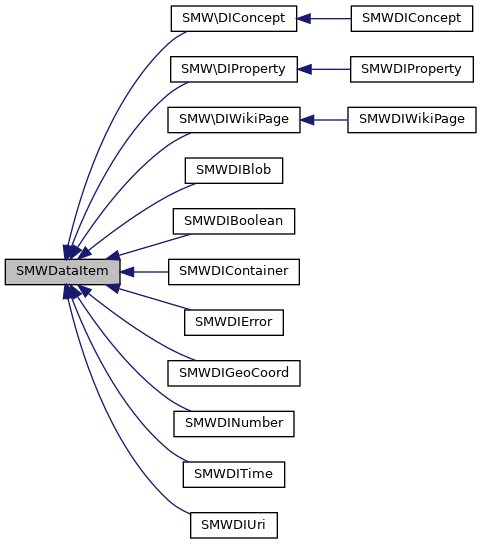
Public Member Functions | |
| getDIType () | |
| getSortKey () | |
| equals (SMWDataItem $di) | |
| getSortKeyDataItem () | |
| getSerialization () | |
| getSha1 () | |
| getHash () | |
| __toString () | |
| setOption ( $key, $value) | |
| getOption ( $key, $default=null) | |
Static Public Member Functions | |
| static | newFromSerialization ( $diType, $serialization) |
| static | getDataItemClassNameForId ( $diType) |
Public Attributes | |
| const | TYPE_NOTYPE = 0 |
| Data item ID that can be used to indicate that no data item class is appropriate. | |
| const | TYPE_NUMBER = 1 |
| Data item ID for SMWDINumber. | |
| const | TYPE_BLOB = 2 |
| Data item ID for SMWDIBlob. | |
| const | TYPE_BOOLEAN = 4 |
| Data item ID for SMWDIBoolean. | |
| const | TYPE_URI = 5 |
| Data item ID for SMWDIUri. | |
| const | TYPE_TIME = 6 |
| Data item ID for SMWDITimePoint. | |
| const | TYPE_GEO = 7 |
| Data item ID for SMWDIGeoCoord. | |
| const | TYPE_CONTAINER = 8 |
| Data item ID for SMWDIContainer. | |
| const | TYPE_WIKIPAGE = 9 |
| Data item ID for SMWDIWikiPage. | |
| const | TYPE_CONCEPT = 10 |
| Data item ID for SMWDIConcept. | |
| const | TYPE_PROPERTY = 11 |
| Data item ID for SMWDIProperty. | |
| const | TYPE_ERROR = 12 |
| Data item ID for SMWDIError. | |
Detailed Description
Objects of this type represent all that is known about a certain piece of data that could act as the value of some property. Data items only represent the stored data, and are thus at the core of SMW's data model. Data items are always immutable, i.e. they must not be changed after creation (and this is mostly enforced by the API with some minor exceptions).
The set of available data items is fixed and cannot be extended. These are the kinds of information that SMW can process. Their concrete use and handling might depend on the context in which they are used. In particular, property values may be influences by settings made for their property. This aspect, however, is not part of the data item API.
- Since
- 1.6
Member Function Documentation
◆ __toString()
| SMWDataItem::__toString | ( | ) |
- Since
- 2.1
- Returns
- string
◆ equals()
|
abstract |
Method to compare two SMWDataItems This should result true only if they are of the same DI type and have the same internal value
- Since
- 1.8
- Parameters
-
SMWDataItem $di
- Returns
- boolean
◆ getDataItemClassNameForId()
|
static |
Gets the class name of the data item that has the provided type id.
- Parameters
-
integer $diType Element of the SMWDataItem::TYPE_ enum
- Exceptions
-
InvalidArgumentException
- Returns
- string
◆ getDIType()
|
abstract |
Convenience method that returns a constant that defines the concrete class that implements this data item. Used to switch when processing data items.
- Returns
- integer that specifies the basic type of data item
◆ getHash()
| SMWDataItem::getHash | ( | ) |
Get a hash string for this data item. Might be overwritten in subclasses to obtain shorter or more efficient hashes.
- Returns
- string
◆ getOption()
| SMWDataItem::getOption | ( | $key, | |
$default = null |
|||
| ) |
- Since
- 2.5
- Parameters
-
string $key string | null $default
- Returns
- mixed
◆ getSerialization()
|
abstract |
Get a UTF-8 encoded string serialization of this data item. The serialisation should be concise and need not be pretty, but it must allow unserialization. Each subclass of SMWDataItem implements a static method doUnserialize() for this purpose.
- Returns
- string
◆ getSha1()
| SMWDataItem::getSha1 | ( | ) |
- Since
- 3.1
- Returns
- string
◆ getSortKey()
|
abstract |
Return a value that can be used for sorting data of this type. If the data is of a numerical type, the sorting must be done in numerical order. If the data is a string, the data must be sorted alphabetically.
- Note
- Every data item returns a sort key, even if there is no natural linear order for the type. SMW must order listed data in some way in any case. If there is a natural order (e.g. for Booleans where false < true), then the sortkey must agree with this order (e.g. for Booleans where false maps to 0, and true maps to 1).
- Wiki pages are a special case in SMW. They are ordered by a sortkey that is assigned to them as a property value. When pages are sorted, this data should be used if possible.
- Returns
- float|string
◆ getSortKeyDataItem()
| SMWDataItem::getSortKeyDataItem | ( | ) |
Create a data item that represents the sortkey, i.e. either an SMWDIBlob or an SMWDINumber. For efficiency, these subclasses overwrite this method to return themselves.
- Returns
- SMWDataItem
◆ newFromSerialization()
|
static |
Create a data item of the given dataitem ID based on the the provided serialization string and (optional) typeid.
- Parameters
-
integer $diType dataitem ID string $serialization
- Returns
- SMWDataItem
◆ setOption()
| SMWDataItem::setOption | ( | $key, | |
| $value | |||
| ) |
- Since
- 2.5
- Parameters
-
string $key string $value
The documentation for this class was generated from the following file:
- SMW_DataItem.php
 1.8.13
1.8.13